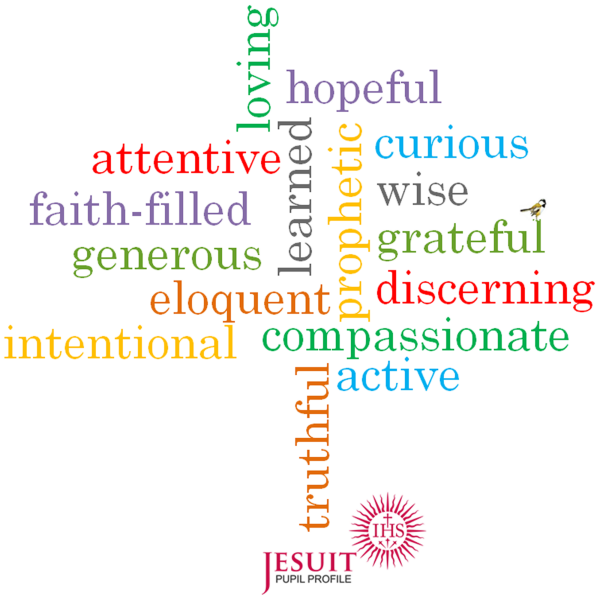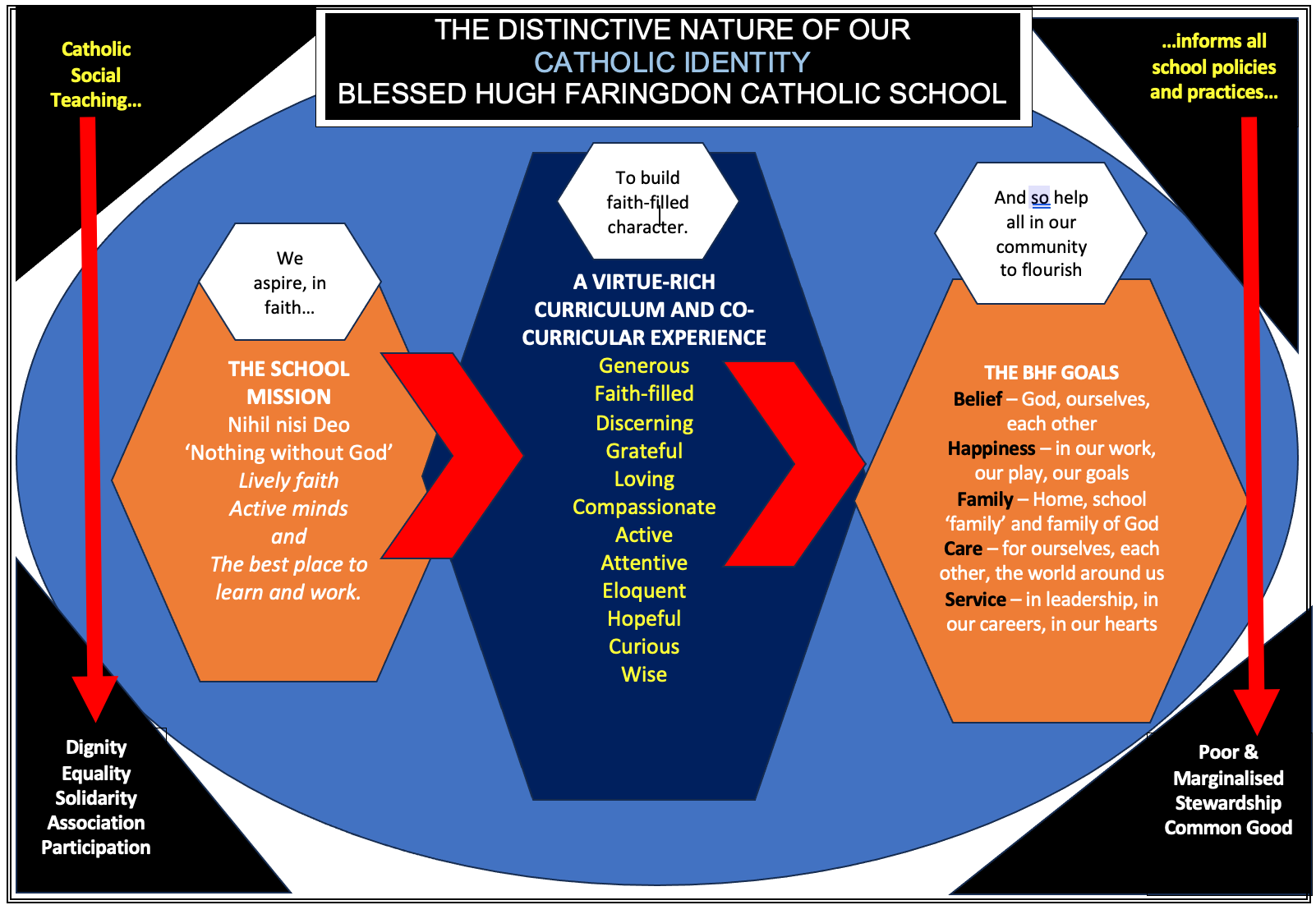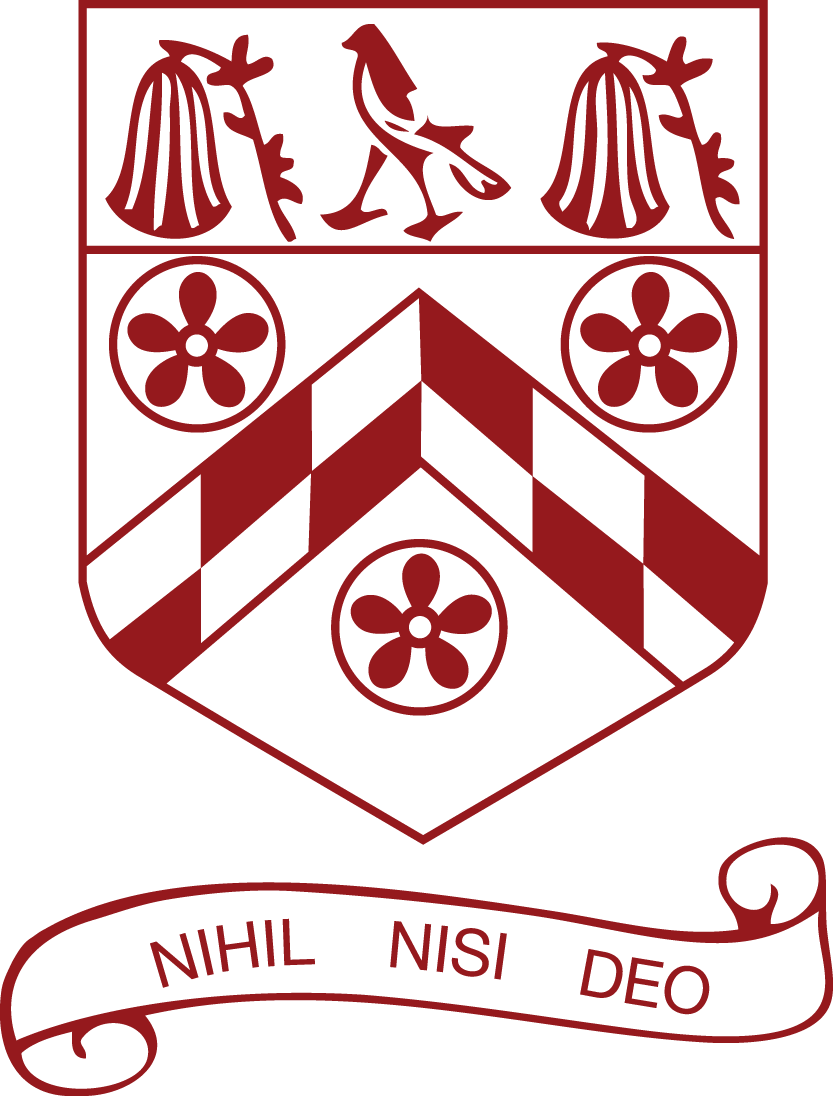Main School
Mission, Character & Goals
Nihil Nisi Deo - Nothing without God
lively faith, active minds and the best place to learn and work
At Blessed Hugh, we recognise that our school would not exist but for the faith of those who built it over sixty years ago. We realise that, with all our confidence and ability, we stand in need of God’s love and grace. At Hugh we want to build a lively faith, inclusive of the diversity of our school. We also commit to making our school a happy place for every member of the school community.
"My question for you is this: What are the qualities you see in others that you would most like to have yourselves? What kind of person would you really like to be?"
Pope Benedict addressing young people at The Big Assembly, St Mary's University, Twickenham, 17th September 2010

"In the Catholic school ... there is no separation between time for learning and time for formation. School subjects do not present only knowledge to be attained, but also values to be acquired and truths to be discovered. All of which demands an atmosphere characterized by the search for truth, in which competent, convinced and coherent educators, teachers of learning and of life, may be a reflection of the one Teacher."
Congregation for Catholic Education (1999)
The Catholic School on the Threshold of the Third Millennium n.14
Grateful and Generous
- Grateful for their own gifts: this means being aware of my gifts – neither too humble nor boastful
- Grateful for the gifts of other people `; their skills and their qualities
- Grateful for all we take for granted : clean water, a home, family…
- Generous in small ways – kindness
- Generous with time
- Generous with our own resources
"If the only prayer you said was 'Thank you', that would be enough."
Meister Eckhart OP (1260-1328)
Questions for reflection...
- How are pupils encouraged to identify and celebrate their own gifts and the gifts of others?
- Is 'thank you' something that is often heard around your school? Are there lots of different kinds of 'thank you'?
- Does your school set out to create opportunities for pupils to be generous - not just with their money but with their time, talents and energy?
Attentive and Discerning
- Attentive - aware of who I am and where I am in life. A sensible idea of my strengths and weaknesses.
- Attentive to my experience – do I learn from an experience?
- Attentive to the things that are good in our life and the things that leave us empty, dissatisfied or unhappy
- Discerning – this starts with attentiveness – with ‘getting real’ about myself and my life and then entails coming to a decision, weighing things up so I choose the better over the good
- For the Christian, this involves being attentive to God’s call and letting this inform our choice e.g. a future career choice or managing a difficult situation
- In discernment we learn more of God, through better understanding God’s plan for us
"Go has created me to do him some definite service. He has committed some work to me which he has not committed to another. I have my mission. I may never know it in this life, but I shall be told it in the next. I have a part in a great work."
Blessed John Henry Newman (1801-90)
Questions for reflection...
- Are opportunities build into the school day/week that allow students/staff to be attentive?
- De we use any mind of examen?
- Do school leaders discern, as well as decide?
Compassionate and Loving
- To be compassionate is to experience suffering or change alongside someone else which involves empathy
- Developing the ability to understand and feel things from another’s point of view
- Moving from ‘noticing’ to ‘being moved’ by what we experience
- Love is something learnt not from being taught but by being experienced
- Parents are the first and best teachers
- Loving people we like is easy, but loving those we either do not like, or – more often – do not know, is a different thing
"We must learn to regard people less in the light of what they do or omit to do, and more in the light of what they suffer."
Dietrich Bonhoeffer (1906-45)
Faith-filled and Hopeful
- Faith in those closest to us including ourselves and family
- Faith in the communities to which we belong: district, parish, school, region, country…
- Faith in God
- Hope rows from faith and love
- Hope is modelled by hope-filled adults
- Lack of hope is a lonely and dangerous place, not helped by cynicism and nihilism
"When you walk to the edge of all the light you have and take that first step into the darkness of the unknown, you must believe that one of two things will happen. There will be something solid for you to stand upon or you will be taught to fly."
Patrick Overton, The Learning Tree (1975)
Questions for reflection...
- Does your school five hope by persistently building up the faith of pupils in themselves and in others? How do you build community?
- Does the school faithfully pass on the living Christian tradition? Does it really put Christ at the centre of everything it does?
- How do you notice when pupils lack faith and hope? And what do you do about it?
Eloquent and Truthful
- Giving a person a voice; an authority
- Expressed not only in speech but in writing, music, drama, dance, creative arts, design, film, media, sport
- Conveying a message clearly and persuasively
- Not just ‘do not lie’ but, rather, seek the deeper truth
- Challenging the soundbite, the binary ‘opinion’ and the prejudiced comment
- Understanding how truth works in academic subjects, including scientific method and religious understanding
"If you look for truth, you may find comfort in the end. If you look for comfort, you will not get either comfort or truth, only wishful thinking and, in the end, despair."
C S Lewis (1898-1963)
Questions for reflection...
- How do you set out to widen your pupils' vocabulary and deepen their language?
- Are there opportunities for pupils to be eloquent in different ways (e.g. public speaking, drama, dance or music, art and digital media)?
- Do you encourage pupils to seek the deeper truth? And to ask the question 'Why?'
Learned and Wise
- To be learned is to be clever, well-read and our school should enable and promote this
- As a Catholic school, this means excellence in teaching, curriculum and support
- It means hiring teachers with a depth and love of their subject
- Knowing when and how to put learning into effect is wisdom
- This starts with knowing yourself well – your strengths and weaknesses
- Self-knowledge includes intellectual. Emotional, social, aesthetic, creative, spiritual and physical
learned: scholarly, erudite, well educated, knowledgeable, well read, widely read, well versed, well informed, competent, lettered, articulate, cultured, cultivated, civilized, eloquent, intellectual, intelligent, clever, academic, literary, studious, sage, wise, curious, inquisitive, discerning, enlightened.
Questions for reflection...
- What does a well-educated person look like?
- Does your school promote a culture of learning?
- How do children learn to be wise?
Curious and Active
- Curiosity leads us to great truth and away from ‘easy answers’
- Curiosity is an engine for learning – inspiring us to continue
- As people looking for life’s greatest truths, curiosity disposes us to find God in all things
- Being active is to become the independent, lifelong learner the school wishes to help form
- Service in the school and beyond is one powerful way students are active
- Taking an interest in civic life reinforces in the young that they too have a voice
"I am human, and so I consider nothing that is human alien to me."
Terence (d. 159BC)
Questions for reflection...
- How do you encourage the curiosity of your pupils? How do you avoid passive learning?
- Do you make sure pupils have opportunities to put their learning into action in ways that are inspiring and change their perspective?
- Does the school have a varied range of extra-curricular activities with high rates of participation across all ages?
Intentional and Prophetic
- We want our students to live intentionally – making choices, such as how to ‘use’ their planet, with a clear view of their own responsibilities
- The pressure to conform, fuelled by social media, has never been so intense. Recognising a freedom to form a view away from the echo chamber or the peer group is a precursor to finding real wisdom
- Living intentionally means developing a set of values to apply to one’s experience, rather than being a ‘victim’ of whichever experience is currently dominant.
- Speaking the truth, especially when it is less popular, is a form of prophecy. This includes standing up for another person, whether in school or thousands of miles away
- Prophecy is not about telling the future, but living out God’s future for me, today
"If a man does not keep pace with his companions, perhaps it is because he hears a different drummer."
Henry David Thoreau (1817-62)
Questions for reflection...
- Are your pupils introduced to people who exemplify what it means to live intentionally?
- Are alternative ways of living, including the Christian way, presented to pupils at key moments in their school lives?
- Does your school create opportunities for individual and groups to be prophetic about things that matter?
As a member of the school community, we aim to develop students and staff with a deep appreciation of what constitutes a flourishing life, appropriate to their faith or worldview but proudly underpinned by the belief that Christ is at the heart of our school community
Our core aspirations are represented in the ‘BHF Way’, setting out our five core aspirations for our students. We aspire to be people of:
Believe |
Happiness |
Family |
Caring |
Service |
In God
|
In our work
|
Family and school together
|
For ourselves
|
In Leadership
|
Belief
This must be nurtured and developed throughout school through excellent liturgy, regular and meaningful prayer, high quality religious education and the opportunity to engage in service to others. Staff, too, given due regard and respect for their own beliefs, should be well-resourced, supported and encouraged to a greater understanding of faith, and its manifestation in our Catholic school.
Within Catholic social teaching (CST) belief, therefore, includes participation, the dignity of the human person and the common good
Happiness
This is not to be found in constant fun and distraction, but in peace, in knowing that one is loved and in experiencing love. Therefore, happiness requires interdependence with others, rather than independence. It requires a spirit of understanding and mutual respect: between students, students and staff, within the staff itself and in the myriad of relationships the school itself has with others.
Within Catholic social teaching (CST) happiness, therefore, includes solidarity with the other, the dignity of the human person and the common good.
Family
The family is a school of love, pointing to, and drawing from, the Holy Family of Nazareth. Though it is not always easy and can take many forms, the family is the primary context to receive love, care, guidance and support, and represents the first educators. Our school, therefore, must work tirelessly to engage with families support them in their role as educators and encourage them in their role as active collaborators with the school community. This is particularly so for hard-to-reach families, those unsure of UK systems and those experiencing trauma.
Our school too, while not a family in the traditional sense, should foster the sense of kinship which comes from being a community, with a shared history, core values and a sense of purpose.
Within Catholic social teaching (CST) family, therefore, includes solidarity with the other, participation, the dignity of the human person, the Common Good and Subsidiarity – the State should only play a family role in extreme circumstances and the dignity of the family unit is profound.
Caring
Caring works in two ways. Caring is focussed on looking after oneself – showing one’s own body, soul and spirit the respect it deserves – just as it is in caring for others. This is particularly so where children and young people have a low self-regard or poor mental health. Caring is also the expression of empathy and inter-connectedness in a society that often privileges a form of independence which can degrade into isolation, alienation and worse.
Within Catholic social teaching (CST) caring, therefore, this theme includes solidarity with the other, the dignity of the human person [starting with oneself], the common good, the promotion of economic justice, the preferential option for the poor and the stewardship of creation.
Service
This is one of the most powerful aspects of the unwritten curriculum. Service operates across the school, in leadership and generosity of spirit, but also as part of the consideration of the vocation of every student. For a student to serve requires the student to [1] see that others matter and [2] that s/he has agency to make a difference. In so doing, the student’s intrinsic, God-given value, over and above her attainment at 16 or 18, is reinforced throughout their journey through school.
Within Catholic social teaching (CST) service, therefore, this theme includes solidarity with the other, the dignity of the human person [starting with oneself], the common good, the promotion of economic justice, the stewardship of creation and participation.
Q. What is Catholic Social Teaching (CST)?
A. The Catholic doctrines on human dignity and the common good that influence everything a Catholic, or a Catholic organisation – like a school – should do
Q. Where does it come from?
A. From Jesus’ teaching, from the teachings of famous catholic thinkers (such as Augustine and Aquinas) and through the Church’s teaching authority
Q. what are the themes?
- Human dignity
Human dignity emerges neither from what people accomplish or own, but because we are created in the image and likeness of God. Consequently, every person is worthy of respect simply by virtue of being a human being. People do not lose the right to being treated with respect because of disability, poverty, age; lack of success, race, let alone gain the right to be treated with greater respect because of what they own or accomplish.
The practice of Catholic social teaching recognizes that, in charity, we have a binding requirement to confront improper and even sinful social structures. “Decisions which create a human environment can give rise to specific structures of sin which impede the full realization of those who are in any way oppressed by them” [John Paul II, C.A. 1991, 38]
- Respect for Human Life
Every person, from the moment of conception to natural death has an inherent dignity and a right to life consistent with the dignity that is ours as human beings.
- Association
The human person is not only sacred, but also social. We cannot consider a person simply as an isolated individual but as a part of a tapestry of relationships. When making decisions which impact others, we must consider how it impacts that person’s connections with family, friends and the wider community.
- Participation
People have a right to shape their own lives and the society in which they live. They should participate in decision processes which impact on their lives and cannot be considered the passive recipients of other people’s decisions. We each have a responsibility to be shapers of the kind of world in which we wish to live. “Freedom…demands the courage to engage in civic life and to bring one’s deepest beliefs and values to reasoned public debate.” (Pope Benedict XVI).
- Option for the poor and vulnerable
In a world where we see deepening divisions between rich and poor, the powerful and the powerless, the Catholic tradition reminds us that God stands firmly on the side of the most marginalised members of society. While every person’s needs are important, we much consider first and foremost how the lives of the most vulnerable people are impacted or enhanced by the decisions we take. “When there is question of defending the rights of individuals, the defenceless and the poor have a claim to special consideration” (Pope Leo XIII)
- Solidarity
We are our sister’s and brother’s keepers. Solidarity means learning that ‘loving our neighbour’ is not, in the words of John Paul II, “a vague feeling of compassion or shallow distress at the misfortunes of so many people. On the contrary, it is a firm and persevering determination to commit oneself to the common good; that is to say, to the common good of all and of each individual, because we are all really responsible for all.”
- Stewardship
We show respect for the Creator by our stewardship of creation. We have a responsibility to care for the world’s goods as stewards and trustees, not primarily, let alone merely, as consumers. As people working toward making these principles a reality, good stewardship also means making careful and responsible decisions with the resources entrusted to us.
- Subsidiarity
The word comes from ‘help, aid or support’. It means deciding on how much we help someone, or a group without helping too much where we end up taking over and not giving the recipients of our help the chance to also learn how to help themselves.
- Equality
Given that every human being is entitled to respect and dignity merely because she/he has been created in the image and likeness of God, it follows that there is a radical equality among all human beings.
- Common Good
A community is genuinely healthy when every single person is flourishing. This means all and not, the best for the majority at the expense of the minority.


